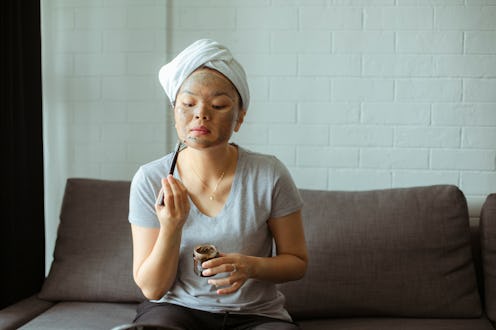(Beauty)
How To Give Yourself An At-Home Facial For Under $100

Great skincare doesn't always have to involve expensive products. Sure, visiting your dermatologist for a check-up or an esthetician's office for some luxe skincare is great, but nothing beats being able to care for yourself in the comfort of your own home. So with that, we've compiled every step you'll need to give yourself a great facial at home with the right products.
Try to make your facial feel as luxurious as possible by adding in a facial massage. The extra step is free, and the results are worth the few extra minutes. "Massaging the skin in an upward motion helps to energize the skin by delivering oxygen rich blood to the area," Candace Marino, a facialist in Los Angeles, tells TZR. "This can help lift and sculpt the features of the face, but most importantly feels great and is a great addition to any home facial." And if you want to get *extra* fancy, she recommends throwing a gua sha facial tool into the mix.
If you're ready to get glowy, fresh skin, follow the seven steps below.
We only include products that have been independently selected by The Zoe Report's editorial team. However, we may receive a portion of sales if you purchase a product through a link in this article.
At-Home Facial: Cleansing Oil
Remove any makeup or excess dirt on the outer layer of your skin with a cleansing oil. This will prepare your skin for proper cleansing that follows. "Cleansing oils remove dirt from the skin more effectively, and they are more hydrating than your regular cleanser," Dr. Shari Sperling, MD of Sperling Dermatology in New Jersey tells TZR.
At-Home Facial: Cleanser
(Penetrate into deeper layers of the skin with a gentle exfoliating cleaner that will go into your pores, ensuring the removal of dirt and oil.) "You'll want to use a gentle, sulfate-free cleanser to remove all makeup, oil, and debris from the skin," celebrity esthetician Renée Rouleau, founder of Renée Rouleau Skin Care, tells TZR. "Once you cleanse, this will prep skin for the rest of the facial that way every step will be equally beneficial. I use a baby washcloth as for someone who deals with sensitive, delicate skin like myself, it makes it more gentle to remove product."
At-Home Facial: Peel
Use a chemical peel as a second exfoliant to open up the pores, and promote brightening and cell turnover. "Chemical peels use ingredients like glycolic, salicylic, mandelic acids or vitamin C. They're applied to your face and left on for several minutes or hours, depending on how deep or aggressive you want," Dr. Sperling explains. "For an at-home peel, I recommend a light vitamin C peel."
At-Home Facial: Steamer
One of the most relaxing parts of a facial is steaming, to effectively open up your pores so that products and formulas can be better absorbed. "While you’re in the shower you can run hot water to produce steam," Dr. Sperling suggests. "Or run hot water at your sink and hold you face a safe distance away to allow the steam to open your pores. You can put a towel over your head to keep the steam in, but be careful and keep a safe distance." And if you really want an upgrade, consider buying Lonove's facial steamer. "This enables extractions to be easier and allows products that are applied after to penetrate deeper into the skin," she notes.
At-Home Facial: Mask
Calm the skin with a face mask for ten minutes. You can use any face mask of your liking, but a charcoal one will further help detoxify. "The key to clay masks is to make sure that when they dry on the skin, and you smile, they don’t crack off," Rouleau explains. "If it does, this is a sign that it’s too drying and that can deplete water out of the skin which is never helpful — even for an oily skin type."
At-Home Facial: Serum
Once you rinse off your face mask, apply a brightening serum infused with vitamin C. This will help restore and even the tone and texture of your skin even more. "Vitamin C serums are high in antioxidants which fight free radicals that enter the skin and can create damage, pigmentation, and skin cancers," Marino explains. She recommends applying vitamin C daily before sunscreen and moisturizer. "I always call vitamin C your insurance policy on your SPF. Even with SPF, you're still encountering damaging environmental stressors, so vitamin C coats the cells within the skin to protect them and prevent damage."
At-Home Facial: Moisturizer
"Hyaluronic acid moisturizers are good for any skin type, especially dry skin," Dr. Sperling explains. "It helps hold onto and maintain moisturize in skin."
This article was originally published on